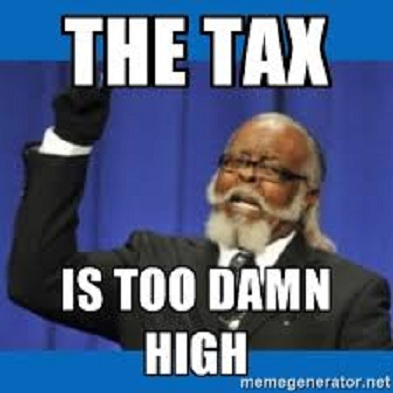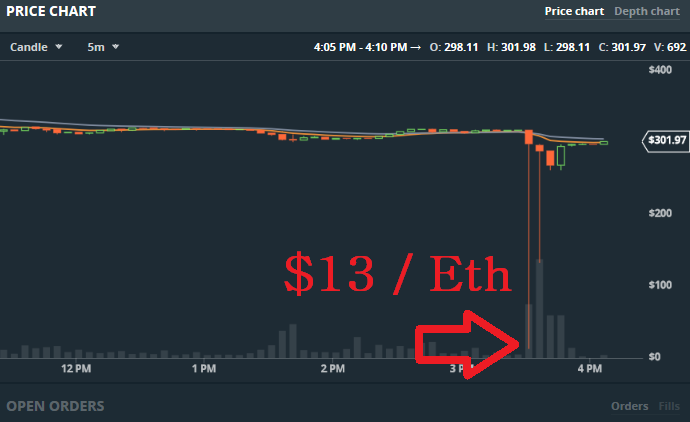Valuing Steem Rewards As Taxable Income Is A Vast Overstatement Of Tax Liability - Part 2 - The Thin Order Book & Flash Crashes
In part one, we covered the taxation topic from a more philosophical viewpoint – should Steemit rewards be taxed at all? How do they differ from digital non-assets like Facebook Likes, Reddit Karma, and World of Warcraft Gold? Is Steem Power technically an asset? You can read it by clicking here.

Unfortunately, as the saying goes, only death and taxes are certain. The reality is, barring luck, most of us will have to pay taxes on any significant "earnings" we make. However, the prevailing view that Steem (Power) should be valued "at the time of acquiring as income" represents a gross misunderstanding of how the Order Book works on your average exchange, and of how thin the Steem market really is.

Every market has an Order Book. Here is GDAX's Order Book for Bitcoin, as of today:

You'll notice that on the right is a list of recent trades which are moving the market in either direction. However, the real "meat" is on the left. Notice the green and red slopes? Those represent how many buyers and sellers, respectively, are willing to buy and sell Bitcoin, how much Bitcoin they are willing to sell, and for what price. If you notice the point of my cursor, you will see that "down-to and including" $1502 USD per bitcoin, you could sell a total of 3618.6 Bitcoin for a total of $7,825,687. What does all that mean?
Well, every time a buy or sell is made in an exchange, the price goes up or down a little bit to represent the new equilibrium between supply and demand. More buys means a higher price, and more sells means a lower price.
Currently, on GDAX, if you sold a little under $8 million in Bitcoin, you would crash the price to a minimum of $1502. I say a minimum, because the reality of momentum traders (those who hop on any trend) and already existent stop-loss and sell orders would likely create a cascading effect, and price could be much lower than $1502. However, without extreme buying pressure moving into the market (which is plausible if other exchanges maintain a high price, allowing for arbitrage by buying low at GDAX and selling high at, say, Poloniex), price could not be higher than $1502.
"Lexiconical, what's the point of all this? You only didn't lose me two paragraphs ago because of your 90's commercial!"
Let's consider a hypothetical executive at Apple with a $1 million salary. For this illustration, let's assume that this executive is paid 100% in fully vested Apple shares. In other words, this hypothetical executive's entire salary is paid in fully fungible Apple Stock that he may sell whenever he likes.
At time of writing, Apple trades at $150.27, so our executive's annual salary is 6655 shares of APPL. 20,832,031 shares traded in the previous day's session, totaling approximately $3,130,429,298, or over $3 Billion. The high and low price for this same day is 150.63 / 148.88.
In other words, it took $3,130 Million ($3.1 Billion) in APPL trades to move the price within a 1% high/low band for the day.
You can see why the IRS would want to value this executive's stock at the price "at the time of acquiring", for a number of reasons. It simply makes sense. If you didn't do this, everyone could avoid income tax by being paid in stock. That's not fair to everyone working for dollars, and it ain't gonna put asphalt into the potholes.

Further, there is no injustice (beyond that of the initial taxation without representation or consent) perpetrated by valuing the stock this way. Our executive could cash out his entire year's salary at once, and he would represent only 1/3130 of the day's traded volume, or .00003195%. Considering the full day's trade managed to move the price within only a 1% trading range, assuming this relationship can be roughly extrapolated, our executive could sell his entire year's salary and expect to move the price no more than 1/3130 of 1%, or .0003195%. Perhaps double this number, to account for the fact it is 100% selling pressure, not split evenly on the buy- and sell-sides.
By my calculator, that's a slippage of only 4.8 cents. Slippage is a term for when a buyer or seller gets a different price than they expected when executing their trade, often from their own buying or selling pressure. A slippage of 4.8 cents in our hypothetical example here is well under 1% of 1%. Effectively immaterial. "Pay up", says the IRS, and you can at least identify their logic.

Now, let's consider a Steem Whale doing the same thing: powering down "$1 million" in Steem Power to pay himself a "$1 Million salary". Yesterday's traded volume of Steem across all exchanges (at time of writing) was $1,777,010. Price moved within a huge range from as low as $1.31 to as high as $1.81, which represents an approximately 38% trading range.
In other words, a mere $1.77 Million in trading, or less than double our hypothetical Steem Whale's cash-out, caused a volatility range of almost 40%, low to high. Now, what's really scary (and a fact we ignored above due to it's immaterial nature with those volume numbers) is that only half of this trading volume was buying, because total volume is a measure of all "shares/assets" traded. So, by definition, the selling pressure was about one half of the volume, or $885,000, and we would expect the rest to be on the buying end. Given the price increase, buyers probably outnumbered sellers.
$885,000 of buying led to a day with a 38% volatility range.
In other words, it took only $1.77 Million in Steem trades to move the price within a 38% high/low band for the day. That's 38 times the volatility off of 1/1762 of the trading, relative to APPL shares. That comes out to 66956x the volatility per dollars of Steem sold vs dollar of APPL sold.

That number should destroy any illusions of valuing Steem at the "price of acquiring as income" of even the most ardent IRS apologist. It is so ludicrously removed from reality that even a government that tells almost only lies can't choke back the laughs as that one rolls out. It's a recipe for tax liability that actually exceeds the liquid value of the thing they are attempting to tax. It's an absolute joke.
What do you think will happen if our Steem Whale dumps $1 Million Steem for trade, in a market where $1 buys 66956x the volatility it does in APPL? He will cause a crash in the order book exactly like the the Eth Flash Crash on the GDAX. The price of Steem will slam down so fast that by the time he is done selling, he may be left with $500,000, $100,000, or even less. The ending price of Steem could be 10 cents, 5 cents, or literally 0 if the entire order book has been destroyed.

The absolutely immutable conclusion is that Steem is not worth what it's current price says, except at the thinnest of sales at the very margin. Valuing our hypothetical Steem Whale's quote-unquote "$1 Million in Steem" at $1 Million USD is an outright lie designed to wrongfully enslave our whale by seizing his property. It's impossible to get anywhere near $1 Million for it. I suspect our whale would be lucky to get even half of that.
The absolutely inarguable fact is that anyone valuing their rewards "at the time of receipt" by the rewards estimate is vastly overestimating the true present value of that asset. It's nowhere near that amount. Pathetically small amounts of selling pressure can drive truck-sized holes through the order book, and we haven't even considered fees and other frictional costs (which would be deductible).
In part three, I will cover the complication that powering down adds, requiring an average of 13-weeks of price data from the future to value SP currently, providing another reason why "valuation at the time of acquiring" is nonsensical.
In part four, I hope to give my own take on a fair way to file one's Steemit taxes. Those that I haven't yet bored to tears will hear all about the excitement of "qualified dividends being taxed at the capital gains rate".
In a bonus part five, I hope to take questions and cover a few potential outside-the-box ideas for reducing tax liability that may not make it into part four. Island vacations and trust divulgments, oh my!
IMPORTANT NOTE: I do not advise making tax decisions based on this post. The IRS is an unconstitutional organization that most closely resembles the authority of a fascist state. You don't want to be a trend-setter in this area. I expect that anyone attempting to justify large amounts of Steem Power earnings using these arguments will be bullied and potentially jailed. You must maintain a consistent tax reporting strategy that is internally logical and consistent if you wish to rely on the "good faith" clause to avoid penalties in the future:
"IRC 6664(c) provides a reasonable cause exception to the penalties under IRC 6662 and IRC 6663 where the taxpayer had reasonable cause and the taxpayer acted in good faith. The reasonable cause exception in IRC 6664(c) applies to all of the components of the accuracy-related penalty on underpayments and the fraud penalty, except for any portion of an underpayment that is attributable to one or more transactions lacking economic substance as described in IRC 6662(b)(6), or that is attributable to a gross valuation overstatement with respect to charitable deduction property. In addition, there are special reasonable cause rules outlined in IRC 6664(c)(3) for certain substantial valuation overstatements."
Tag @exyle, you're it!
IMPORTANT NOTE AGAIN: I AM NOT A PRACTICING ACCOUNTANT. YOUR TAXING AUTHORITY IS PRACTICALLY ABOVE THE LAW. PROCEED AT YOUR OWN RISK WITH ALL TAX LIABILITY REDUCTION STRATEGIES. DO NOT BE THE GUY IN JAIL BECAUSE SOME DUDE WITH A LINK TO A COMMERCIAL FOR A 1990'S BOARD GAME BASED ON SHOOTING BALLS AT OTHER KIDS' BALLS RANTED ABOUT TAXES TO YOU ON SOCIAL MEDIA. GEORGE TAKEI IS NOT A LEGITIMATE SOURCE FOR TAXABLE INCOME CALCULATIONS.
Copywright: The Thin Red Line, Milton Bradley, 3rd Rock From The Sun
Sources: GDAX, The Lexiconoloniex(tm) Exchange, Coindesk.com Eth Chart
@lexiconical this is a great series of posts for encouraging an open minded approach to the rewards on Steemit which I enjoyed reading and reconsidered my position on even to the point of making comments saying I would change my mind.
Reading the comment by @sean-king though reinforced the view I shared before in the article you reference at https://steemit.com/steemit/@jerrybanfield/steemit-tax-calculation-and-payment-system which I believe still most closely complies with the existing law in the US. While what you have shared here is exactly right in theory, the key point for me is that I want to sleep soundly at night knowing that I have taken the best approach I know of with the taxes. Your points are all valid but the fact remains that it would be easy for the IRS to hit me with massive penalties on an audit including as much as prison time for failing to report my Steem Power and SBD income received. It is worth it to me to just pay the taxes and then sure if I did not do the calculations exactly they way they like then I might be off by a little bit and no big deal. Until we can get the IRS workers to stop showing up from work because they are conscious of the fact that they are a key point in the system for oppressing the entire world, then a conservative approach is the most reasonable angle to take. I am all for standing up to tyranny but in this case an approach that is less easy to counter is logical. Better to pay the taxes and work on raising all of our consciousness than make an easy target for tax fraud!
The assumption being made here is that STEEM coins and STEEM dollars are income. As far as I know, the federal government doesn't recognize digital currency as a legit form of money; therefore, the IRS cannot tax it as income. I have read that the IRS classified it as property, but not sure if that's been changed.
According to IRS guidance, digital currency is to be treated as property for income tax purposes. This means:
It goes on to add:
So there you have it:
The IRS is also clear that FMV has to be determined for the property within the year it is reported as income. If it is held as investment property, then the FMV is within the year that a Capital Asset gain/loss occurs. It should be noted that the IRS does suggest using data close to the property exchange date to determine FMV.
If you're really concerned over whether your crypto actions will get you arrested, may I point your attention to FinCEN the agency most likely to arrest you. I've just finished this article which really just starts the conversation: Congressional Carnival [S1E2]: Former Libertarian Candidate and Bitcoin Trader Sentenced to 46 Months in Jail for “Conspiracy to Run an Unlicensed Money Services Business” [STEEMIT EXCLUSIVE #1].
https://steemit.com/cryptocurrency/@xervantes/earn-free-coins
what do you think about it? You know about it? Know about the owners? Does it remind you anything similar in the past?
Thank you ! Thank you!
Image courtesy of pixbay
I'm pretty new to the whole e currency world, but have done taxes since the early 70's, taken some courses and worked as an accountant and so on my whole life.
Your article is one of the best tax discussions I've seen on Steemit.
This is new territory for the IRS too! Of course they want to extract as much $$$ from the taxpayers as possible but believe it or not they are generally open to real discussion (think debate competition) and the "You must maintain a consistent tax reporting strategy that is internally logical and consistent if you wish to rely on the "good faith" clause to avoid penalties in the future" is the crux.
As stocks, derivatives, bonds , and all the other myriad investments and their comes developed over time so did the policies.
Right now we are in the same boat! The policies are in the formative stages, some in place and some being thrown out there to see how we, the people, react.
So fellow Steemers, be careful and understand that there will be taxes...
TANSTAAFL...!
Well said! They will take from us everything that we voluntarily hand them. It is up to all of us to "fight" (debate) our way to a fair tax liability.
Every time someone overpays their taxes, the IRS is game-theoretically correct to try and take just a little more from all of us. Why not, if we won't defend ourselves?
Man, they should be teaching this stuff in schools.
You make this complicated topic into something surprisingly fascinating. Thanks for helping me understand the order book.
Maybe you should be teaching this stuff in schools.
EDIT: The order book stuff is especially fascinating. The first time I've encountered this graph is in the Steemit internal market. I went hunting around Google to see similar charts for NYSE stocks, but it seems like this sort of info isn't available except to traders paying for the service, am I right?
So, on the internal market page, it looks like I can put in an order to buy STEEM only when it gets down to a particular price, or sell it only if it rises to a particular price of my choosing. But if I were to sell, say, a large volume of STEEM in a hurry at the current highest bid, I would only be able to sell so much of it, thus forcing me to lower my price and drive the market down. Again, am I understanding this right?
"But if I were to sell, say, a large volume of STEEM in a hurry at the current highest bid, I would only be able to sell so much of it, thus forcing me to lower my price and drive the market down. Again, am I understanding this right?"
Exactly right. The more you sell, the more you would drop the price. Unfortunately, I'm not sure if it's possible to accurately model exactly how much selling pressure it takes to drop the price at any given time. I can compare the relative volatility to something like Apple stock, but only with the benefit of hindsight. I couldn't tell you at what point your personal slippage becomes material to your total income.
However, I can tell you it's about 66900x less than it would take if you were selling Apple stock, and I suspect it is actually very material to a lot of users. You absolutely cannot dump 6 figures or more without a material price change.
Thanks for taking the time to answer my question. Looking forward to the rest of the series.
Brilliant. thank you. Fully upvoted you.
Thank you for your support!
i had to go back and read it all again after reading all these comments, fascinating stuff!
Key takeaway:
You have a talent for making dense information understandable. Or at least chewable.
Good work! 👍
Thank you! The truth is, I have been trying to work that Crossfire commercial into something since I started at Steemit. I don't know why, but I just find it hilarious.
Super technical but great points! Let me try to connect this with something else that I can't get my head around... are bitcoin or monero or any other mined coins, taxable at the value when received?
If so, then effectively, we will be under the money if the mined coins or steem rewards will be sold less than the effective taxes. What do you think?
Thank you for sharing your valuable thoughts. Upvoted resteemed and following you :)
I read this article yesterday, you might find it of interest.
https://www.forbes.com/sites/greatspeculations/2017/02/21/if-you-traded-bitcoin-you-should-report-capital-gains-to-the-irs/#44d521a9e3d8
Here is an excerpt:
Good one @heroic15397! Thanks for sharing. Just followed you as well.
Yes, at least the IRS has (I believe) released a statement saying that mined cryptocurrencies are to be considered income subject to normal deductions. So, the situation you described where you can end up owing more tax than what you "earned" is not only possible, but likely exactly what the IRS is hoping will happen.
I'm writing this series of posts to, hopefully, reason these exact sorts of questions out and provide a reasonable tax strategy that will hold up to scrutiny under the good faith clause.
Thank you @lexiconical. I am looking forward to it!
Excellent job @lexiconical
I glazed over a little but the crossfire commercial got me through to the point where you pulled me back out again.
Just to confirm, trying to sell $1 million US worth of STEEM all at once would drive the price so low (because of the low volume of trades), that it's effective value would be minimal and all you might be doing is creating a great buying opportunity for someone else.
So paying taxes on a theoretical, instantaneous valuation, is dumb.
You managed to say in 2 paragraphs what took me 20+. I figured I better show all the work, though!
That's exactly right. You can expect each dollar of Steem you sell to cause roughly 65000x as much volatility as each dollar of Apple share you sell.
Thus, taxing the two under the same regulations is quickly rendered nonsensical. It's like governing an 8-year-old's lemonade stand and Exxon-Mobil corporation with the exact same regulations.
Which, if you've been keeping up with the news, may actually be happening with the rise in "lemonade stand tickets" cops are giving out.
@lexiconical I wouldn't have been able to boil that all down if you hadn't done the work to put it there in the first place.
There's no way I would ever have been able to find, compile and understand all of that, maybe not any of it.
You managed to put something very technical into terms that someone not at all familiar with exchanges and trading could grasp.
That's no small feat.
Awesome work.
Thank you for such kind words.
I'm just being honest.
It's one of my faults.
Part 3 is now live! You can click here to read it.
Very nice explanation. I very like your comparisons and examples that you point out. Even if someone isn't familliar with the topic I'm certain that they'll understand. Already learned a lot from you and I'm wainting for part 3 :)
And Btw I bet this apple comparision wasn't coincidence :p
Thank you for the kind words. Taxes are a boring, dense, and deliberately over-complicated topic. Unfortunately, they are also something we all need to be able to "defend" ourselves from with understanding.
Apple made for a liquid, large, and very identifiable market but it is, admittedly, just about the largest one I could have picked.